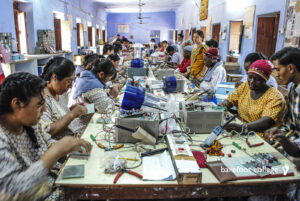First published in cityAM
Authored by: Yasmin Waljee OBE, International pro bono director, London @ Hogan Lovells.
How can we help women in the developing world rise out of poverty and achieve gender equality?
For Barefoot College and law firm Hogan Lovells, the solution lies in “solar mamas”: the women setting the world alight one solar panel at a time.
Founded in 1972, Barefoot College is the first and only college built by and for the rural poor. Barefoot started training women in India in 2005, and since 2008, the college has trained 1084 women in 83 countries as solar mamas.
Women from around the world spend six months training as solar engineers at Barefoot’s campus in Tilonia in Rajasthan, India.
Now, Hogan Lovells and Barefoot College have launched a three year partnership, aiming to bring clean, renewable light to 200,000 people by training 400 solar mamas at five new regional training centres across Africa, Latin America, and the Pacific Islands. Hogan Lovells is also providing pro bono legal advice and financial support for this expansion as part of their global Citizenship programme.
The Barefoot students learn through sign language and a colour-coded textbook, two inches thick, brimming with pictures of wires, charge controllers, and panel circuits. In 2008, they hosted their first international solar mamas – two 40-year-old women with no formal education from Timbuktu, Mali. After their training, their village was the first in West Africa to have solar electricity.
Barefoot provides solar equipment and panels to villages for the solar mamas to install, and each household that is solar electrified pays into a village fund which covers the solar mamas’ time and maintenance of the equipment.
Most women have never travelled outside their home villages, many are grandmothers, and a majority are illiterate. But within six months, they become solar engineers who can create, install and maintain solar panels, and generate development upon returning to their communities.
Solar energy offers immediate health, education and economic benefits. It removes the use of the toxic fuel kerosene; it allows children to study in the evenings under the light of the solar lamp; and incomes also tend to rise as families pay a small proportion of what they used to pay for kerosene, candles and batteries, with light in the evenings allowing adults to work.

Barefoot’s programmes have been working towards UN Sustainable Development Goals (SDGs) long before they were agreed by world leaders in 2015. The SDGs are a set of 17 goals that are a universal call to action to end extreme poverty, fight inequality, and tackle climate change by 2030. Businesses, governments, and citizens are all expected to play a role, with the potential business opportunities of the goals estimated at US$12 trillion by 2030.
This solar training programme helps achieve seven of the 17 SDGs, including tackling poverty, promoting gender equality, and developing affordable and clean energy.
Barefoot has learned over time that investing in women is better for the community. Once trained, men often sought work in cities and left their families behind. Women, especially grandmothers, tend to be more embedded in their community and stay and support their villages.
This work goes a long way to achieving gender equality as the solar mamas become respected community advisers and role models for young girls. One village chief in Togo even turned his all-male advisory group into an all-solar mama group after they electrified the village. Hogan Lovells and Barefoot College share the vision of a world of empowered girls and women, using innovative techniques to solve complex, global problems.
Taking their partnership a step further, Hogan Lovells and Barefoot College recently launched a global innovation awards programme, collaborating with SEED and Adelphi, to recognise and reward locally-led businesses and not-for-profit organisations in developing countries that use solar energy or technologies to benefit lives in poor communities.
The Hogan Lovells Community Solar Innovation Awards 2017 winners will be honoured at a ceremony in March 2018 in South Africa, and will receive a tailor-made business support package including up to US$30,000 pro bono legal advice, peer networking, one-on-one support and mentorship to develop business and financial plans, and support from SEED to replicate their business model in other regions around the world.
Hogan Lovells will also provide a US$10,000 financial award to one overall winner to cover the organisation’s most pressing needs.
These types of partnerships between traditional businesses and innovative organisations are just what the world needs to achieve gender equality and bring power to the developing world.

